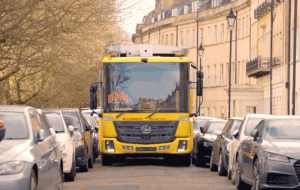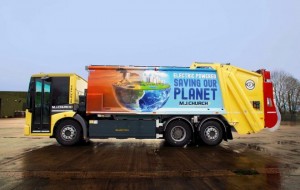One of the world’s first all-electric refuse vehicles will soon be collecting commercial waste from Bath firms following a £500,000 investment by waste management and civil engineering firm MJ Church.
The pioneering truck, pictured – the first on the UK’s road – has been built to the Marshfield-based firm’s strict zero emission specification.

That means it can be used to collect waste from businesses based in Bath city centre without incurring penalties as it complies with the recently introduced Clean Air Zone (CAZ).
It will also meet the restrictions of Bristol’s up-coming city centre CAZ and others expected to be rolled out in urban areas over the next few years.
The truck has been designed to be compliant with the newly announced Bath the impending CAZ in Bristol and the expected roll out of others in urban centres around the region.
MJ Church and the truck’s manufacturer, Blackburn-based Electra Commercial Vehicles, calculate it will save six tonnes of CO2 going into the atmosphere each year compared to a diesel vehicle.
To offset this, diesel truck operators would need to plant 36 trees a year per vehicle – or 2,520 trees for a fleet of 10 diesel trucks over their typical seven-year lifespan.
As well as will collecting from a wide range of commercial and retail businesses, the truck will also provide a vital service for hospitals, doctors’ surgeries, schools and retirement homes.
MJ Church’s specification meant that the truck had to be engineered to far outperform any other comparable vehicle ever built and included a 10-hour operating shift range and an electrically-powered hydraulic lifter, packer and compactor capable of lifting large commercial bins, emptying them into the hopper, compacting the refuse and subsequently ejecting it.
And because this demands a lot of power, with significant stress on the truck’s batteries, no other manufacturer had been able to come up with a robust, efficient and reliable solution until MJ Church and Electra teamed up.

The two firms are now working on the next generation of vehicles, which will be even more efficient, and also looking at reverse engineering some of MJ Church’s existing diesel vehicles to convert them to electric power.
MJ Church director Tom Church said: “We are delighted to be launching this revolutionary vehicle, which will make a significant contribution to cleaner air for local people whilst guaranteeing an excellent level of service at lower costs for businesses in Clean Air Zones as they get rolled out across the region.
“Emissions levels in urban centres are a serious issue – it goes way beyond business. Nothing is more important than peoples’ health.
“We have been watching this issue develop over the last few years and as awareness has increased, so the pressure for meaningful change has increased with it.
“It has been apparent to us for some time that establishing low-emissions zones in cities is simply the right thing to do and has therefore become inevitable.”
He said the firm took the view that it would not only have been irresponsible to continue to add to the problem by ignoring it, but it would also have been a failure as a business not to be able to lead the way in investing in the technology that solved the problem and enabled its customers to have their waste collected with a minimum of disruption and without incurring the financial penalties associated with low-emissions zones.
“Most businesses do have a sense of social responsibility and see themselves as vital parts of their communities,” he added.
“They want to operate sustainably and create as little negative impact on their environments as possible.
“By making this investment we do have significant initial costs to bear, but we do know that we are absolutely doing the right thing as a business ourselves and on behalf of all our customers and we know that this will bear dividends in many different ways in the medium and long term.”
Family-run MJ Church is one of the South West’s largest civil engineering, earthworks and waste management contractors, employing more than 400 people.
Among its current projects are major earthworks for National Grid to bury unsightly overhead cables in an area of outstanding natural beauty (AONB) in Dorset and a £17.5m upgrade of junction 15 of the M4 motorway near Swindon.



















